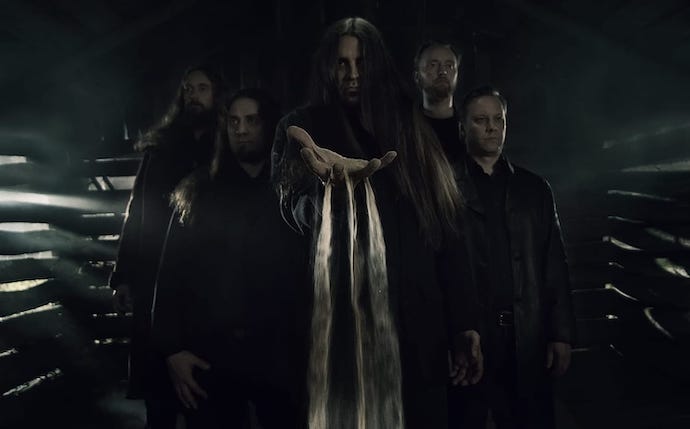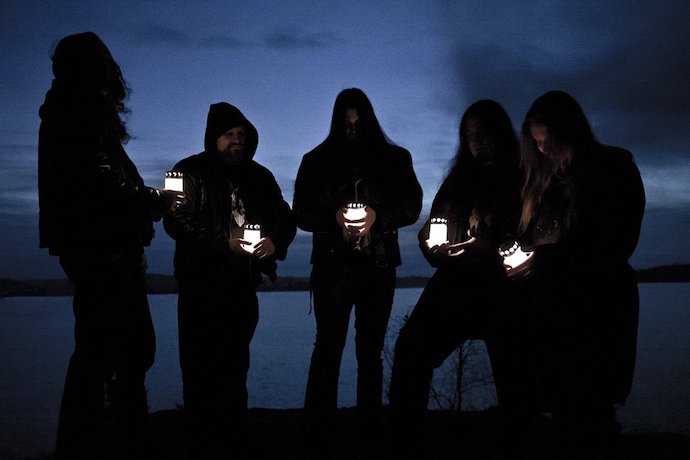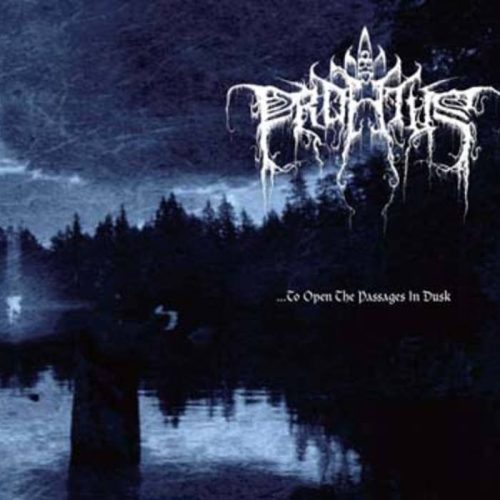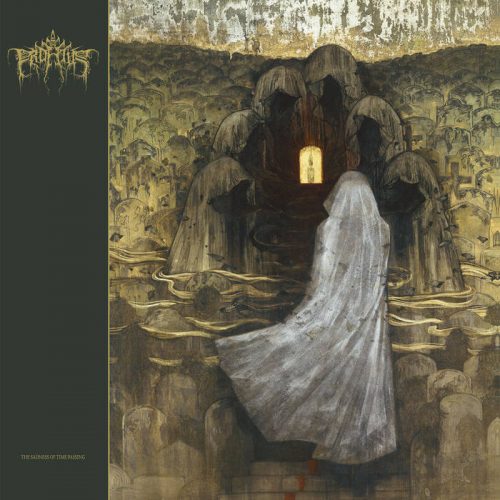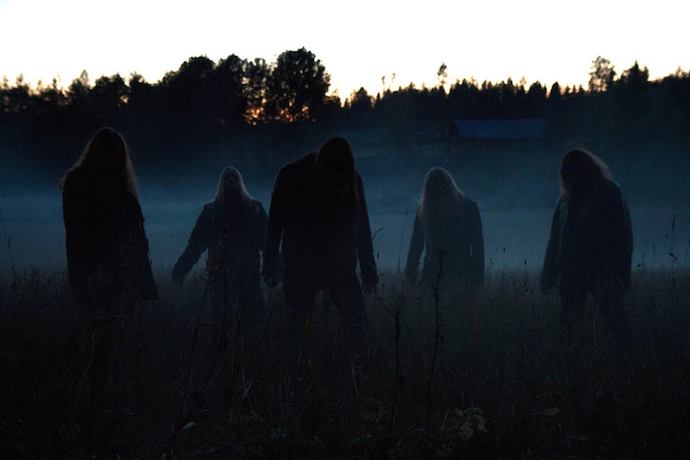(This time Comrade Aleks brings us a revealing interview of Anssi Mäkinen, guitarist/vocalist of the Finnish funeral doom band Profetus, whose latest album will be released by Avantgarde Music and Weird Truth Productions on October 11th.)
Finnish funeral doom metal is a kind of trademark. In all ways you may be sure that a band from Suomi will grant you a massive overwhelming experience of utter desolation and cosmic loneliness. Such is Profetus, who started in Tampere 13 years ago.
Through Coronation Of The Black Sun (2009), …To Open The Passages In Dusk (2012), and now The Sadness Of Time Passing, the band has raised its ghostly sonic monolith built of down-to-earth burial riffs, immense guttural growls, and majestic and noble melody in its modest keyboards parts.
The Sadness of Time Passing will be out on Avantgarde Music on the 11th of October, and as Anssi Mäkinen (guitars, vocals) is the only Profetus member left from the original lineup, we spoke with him of the band’s past, present, and a bit of its future.
******
Anssi, Profetus was formed 13 years ago, and since then you have recorded three full-length albums and one EP, and that’s a good score. Did you plan from the start to keep the band active as long as you could, or did you consider it a just a project back then?
Yes, it started as a project with the Saturnine demo. During that time the Finnish scene was pretty saturated with extreme doom, and lots of concerts were held in nearby clubs in Tampere. Esoteric, Skepticism, SunnO))) and so forth. In those social circles I met the right people to start up a band project.
What was your original vision of the band? Did you say to yourself: we’re gonna play funeral doom with obscure lyrics, and that’s it?
I’ve always been just experimenting with different structures and ingredients. Funeral doom as a musical style is just an umbrella term for bleak and slow metal music, avantgardish by its nature.
It can have elements of all kinds of musical styles, if you think of the prog influences of Esoteric, the Church music chorales of Skepticism, the slight Jazzy undercurrents of Funeral Moth, etc. We as a band started with something more bleak and monotonous, and everything else kind of developed down the road.
It’s interesting that you identified different branches of funeral doom in your answer. Where’s Profetus’ place in the funeral territory? Do you search for a minimalistic and laconic form of funeral or do you see its basic elements as a fundament for raising your own sound with its own features?
I believe minimalism isn’t just the right word to describe it, as we are basically gathering a huge spectrum of melodies and arrangements in a song – even though there’s a lot of negative space in the music and the performance itself. Time between the beats can really stretch freely, so it all falls into some sort of “dead beat”. I really love those moments.
I’d say we are researching the Finnish landscape of funeral doom, the melodic qualities and mind-set of our culture. For me it’s totally personal and honest.
Your debut full-length Coronation Of The Black Sun saw the light of day through the small Finnish label Rusty Crowbar Records. Did it attract some attention to the band? Did you get any feedback?
Yeah, we had the album out in early 2009. We had a new drummer, Valtteri, who still works with the band. After realizing how slow, hard, and steadily he could play, we started to do shows and organize them ourselves, and made a small phenomenon around the band and our live sets.
I was pretty active in the scene back then, and organized shows for Mournful Congregation, Longing For Dawn, Mourning Beloveth, Paganus, Garden of Worm, and finally Tyranny when I met Matti, who later joined the band. The live sets of that era really made the influence of the band’s sound and dynamics, and basically set the scene for us as a band.
Profetus – When The Watchers Dusk
Being Profetus’ guitarist and vocalist, do you feel limitations that the funeral genre puts on you as on an artist? Did you feel you had enough too little space to express yourself through this form in Coronation Of The Black Sun?
No, not at all. It’s a minimalist form of music and the subjects behind it are really rich. I see it more as a framing than a barrier.
Coronation is basically a collection of my older written material done in my youth, mostly the time I spent with certain people, one being Johannes Nefastos (The Star of Azazel), who also wrote the lyrics for “Blood of Saturn”. So it pretty much dealt with those personal subjects of the time, and can’t be re-produced, so to say.
The second album …To Open The Passages In Dusk was released by Weird Truth. Was it a breakthrough for the band? Or was it at least a kind of recognition?
Yes, in a way it was a milestone — then, we started to develop something of how the modern Profetus sounds, as well as taking a step further to be just raw and minimalistic. We crafted the sound together with our guitarist at the time, Eerik (who nowadays has a band called Arche) and summed up a somewhat modern approach to an old sound and music that we were both into.
What made you proud of this album? Can you say that this time you managed to channel your feelings in a more precise and sharper way?
Our musical craft started there and we found a clearer voice, so to speak. It had to do with both the stronger line-up and also the natural evolvement of the compositions. I’m not perfectly happy about it, but what we found there was the magic of ultra slow drumming — no fills, just accents. On the lyrical side it’s also very spiritual, maybe the most religious sounding work of ours, and really pitch-dark.
Did you have some certain requirements to Profetus’ sound when you entered the studio to record the album? What did you personally want to improve on in comparison with Coronation Of The Black Sun?
In the past I wanted the band to sound more dim and gritty. We used a lot of feedback harmonies, and the whole result was also put together in the mix — like most funeral doom bands still do in the footprints of Nortt, Worship’s demo, and so forth.
After that, the focus has turned more into drums and especially keys and organ, as well as baritone guitar through bass cabinets, which adds both heaviness and harmonic balance between all instruments — a bigger surroundings for things to happen.
With this album, I worked with both Matti (the mix) and Dan Lowndes (the mastering) to come up with the final result of grim but very natural sound, and both guys had a clear vision to carry it onwards. So what you’ll hear on the record is the closest we got to the natural sound of our live setup, lots of dynamics and nuances — so it needs a proper sound system and loud volumes to truly shine.
What were your relationships with the label? Did they provide to the band some media support or was it just a deal for pressing the run of CDs?
Currently it’s going to be released by two labels, Avantgarde Music (CD, LP) and Weird Truth Productions (CD).
Avantgarde is a new label for us, but they have a great history in extreme metal, so I feel proud to be in his ranks. Not forgetting that he released Thergothon’s album, which was one of my reasons to dive into this music, as well as other strange jewels like Monumentum (as well as Dolorian, which can be put under the same discography even though it was released by their sub-label), I felt there was a connection between us and the label and the people behind it — and that’s enough for me.
I’ve known Makoto (Weird Truth) since the demo days. He was actually the first label to distribute Saturnine back in 2007, so he is a long-time supporter of the band. Among other great releases he put out back then were Worship, Mournful Congregation, Nyarlatotep, etc., and so co-operation with him was an axiom. He is one of the labels who has delivered quality releases for a long period of time and still does.
By the way, did they offer you to play in Japan?
It’s on next year’s plans.
Really? I bet you won’t fly there just for one gig. How many gigs do you plan to perform there? Do you have a proper fan-base there, or is the label’s support enough for you to commit to this trip?
Yes, I believe so. Rough planning for this is already done in the past and it’s basically just a few flight tickets away.
Profetus – The Sadness Of Time Passing
Metal-Archives sums up Profetus’ lyrical themes as “melancholy, sadness, occultism, nature”. Can you tell us whether all of these images are present in your new album The Sadness Of Time Passing?
Yes, this is how they put it on the Metal Archives — but of course it’s much wider than that, “the depths of human condition”, or something like that.
The Sadness Of Time Passing is a concept album of time, mortality, the sense of momentary passing of your life towards death, existence and what’s beyond. The song themes themselves rise from different literary and personal sources, piercing my own history and memories and descending to rather expressionist landscapes. The writing happened in a life-span of five years, so it was also an era of my life with changes, lots of personal losses, and new beginnings.
On the lyrical side it dwells on certain topics reaching from Zen Buddhism to folk themes and ghost stories and Finnish modern poetry. The tracks will include some phrases of different source books I used to make the whole work, all dealing with the concept of solitude and spiritual isolation. But for experiencing that, I’d rather leave the door open for the listener to make something of their own out of it. It’s not an easy album in any case, but might grow to a certain level after many listens and readings.
Speaking about changes… Do you feel that Profetus changed you in some good way?
I believe it has done a lot for a certain self-reflection across the years. For me it deals with my own microcosm and moving things from there into a different scale is always comforting.
Even though I’m not a religious man, I think in human conception there’s always a yearning for spiritual landscapes, understanding their own cosmic loneliness and the strange emptiness. Especially behind the suggested life in Western society today. If you find a root, you should dig it up.
How long did you work on the new material? How do you see the core differences between The Sadness Of Time Passing and …To Open The Passages In Dusk?
It actually took five years in total, which was really an unexpected and winding path. Never planned to take so long, I just felt I should push it a little bit further from standard song-writing. The songs have been existing to me for many years as well, so it’s about time for other people to hear them as well.
Thematically I see Sadness as a continuation of the ghost theme on Passages — it has the same kind of moments of eeriness, but also more serene and hopeful parts, more packed with melodies, and in that sense easier but with a larger construction.
Do you plan to support The Sadness Of Time Passing release with some gigs? Do you feel a necessity to play live with Profetus? What are the band’s highlights considering gigs?
Yes, absolutely. I see us as first and foremost a live band, who sometimes succeed in putting their efforts on a recording. Our music is about the acoustic space and stretching time between those notes, cranking the amplifiers and enjoying the whole situation. On the downside, the setup has grown quite large to perform in the smallest of clubs, but when I see the scale right, we are totally up for it.
This year we did only Killtown Deathfest in Copenhagen, playing The Sadness Of Time Passing entirely — but we are planning some festivals and maybe a small tour to happen next spring in central Europe.
https://avantgardemusic.bandcamp.com/album/the-sadness-of-time-passing
https://profetus.bandcamp.com/
https://www.facebook.com/SaturnineDoom

